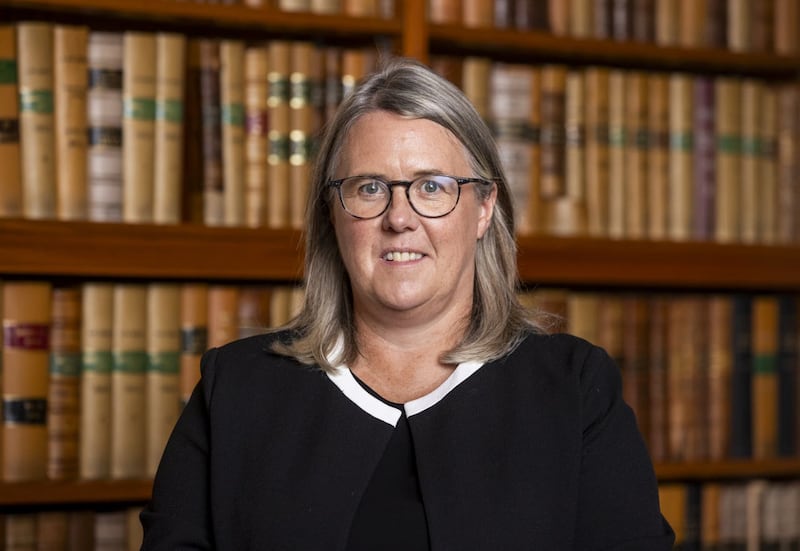A new centre in Belfast will protect victims of sexual offences from the “traumatic experience” of giving evidence in court, the chief of the victim support agency has said.
Janice Bunting, chief executive at Victim Support NI, also said giving evidence away from court would remove the possibility of victims running into the defendant.
The Belfast Remote Evidence Centre enables vulnerable or intimidated victims and witnesses to speak to the court, using live link video technology.
The facilities also include waiting rooms with toys and colourful murals to allow child victims of sexual offences to relax and play before giving evidence remotely.
Several soundproof live link rooms with a computer and webcams enable children and adult victims to speak directly to the court, just a short distance from the waiting room.

Ms Bunting said victims can feel unsafe in the court environment.
“The courtroom experience can be very, very daunting for victims that can feel very, very intimidated, they can feel very unsafe,” she said.
“They’re afraid of meeting their perpetrator, they’re afraid of meeting their perpetrator’s family.
“And so having a facility that is away from the court, in this type of location is very beneficial to victims.
“It builds confidence in them giving their evidence.
“It helps them give better evidence.
“It makes them feel safer and be safer.”
A camera that shows the full view of the evidence room is viewable only to the judge to ensure only approved adults are in the room and no-one is prompting the witness.
The witness can see the court when they are giving evidence but camera angles are checked to ensure they can only see the judge and counsel, never the defendant.
The remote evidence centre comes as new laws are coming into effect in Northern Ireland that ban the public from attending serious sexual offences trials.
Lifelong anonymity for victims of sexual offending will be extended until 25 years after the victim has died and suspects will be given anonymity up to the point of charge.
The new rules announced by the Department of Justice implement recommendations made by Sir John Gillen in his review into the law and procedures in serious sexual offences.

Ms Bunting said she understood concerns relating to open justice, but the remote evidence centres would build confidence in child and adult victims of sexual offences.
“We’re a Victim Support agency so our thought process will always be around the victim and how the victim is going to experience the court process.
“They’re at court because they have had a very traumatic experience, particularly in sexual offences,” she said.
“And the idea of open justice in relation to sexual offences is not being challenged here because members of the press can still attend.
“In terms of victims giving evidence, they are going into that court knowing that it’s not packed with hundreds of people who are going to listen to them talk about the most intimate and traumatic experience in their lives, and I think we have to remember that.
“So anything that puts the victim in the centre of this and improves the experience for victims there’s only a good thing because that builds confidence then and other victims coming forward and reporting their crime to the police.”
She added: “The idea of a victim in a sexual violence case being able to go into court and know that those most intimate moments are not going to be replayed in front of the public gallery I think it is a confidence building measure.
“And we would commend the fact that the Government and the Department of Justice are outworking the reviews and the Gillen reforms.”

Jenny Boyce, the service manager for the young witness service at the NSPCC, said the remote evidence centre was “absolutely key” for child victims of abuse.
“It’s a fantastic new facility in terms of supporting young people who have already been through a really traumatic event in their life,” she said.
“Young people will tell us that attending court can re-traumatise them.
“It’s incredibly distressing.
“And so an environment like this, that is safe, it’s child centred.
“It’s a calm experience for them in comparison to entering the court building.
“We’ve had young people tell us that going into court feels like they’re being taken to prison.
“And then on top of that, the chances or the fear of meeting their defendant makes it incredibly distressing for them.
“So here they feel safer, they feel more able to give their best evidence which enables more likelihood of justice.”
Ms Boyce said that young people giving evidence in a safe environment, outside of court, would improve the quality of evidence given.
“We strongly advocate for the use of remote evidence centres for young people, the more young people that are taken away from court, the better we feel the outcomes would be,” she said.
DOJ permanent secretary, Richard Pengelly CB said the opening of the centre was “an important step” towards supporting victims.

Lady Chief Justice Dame Siobhan Keegan said initial feedback showed that, without being able to give evidence remotely, some victims would have dropped out of the criminal justice process.
“While at an early stage, there is also some evidence to suggest that the availability of the REC and associated lower dropout rates could contribute to a higher number of early guilty pleas.
“The judiciary are fully supportive of this initiative and would encourage a greater take-up by the profession.”
The total cost of the capital work to deliver the centre was £442,000.

